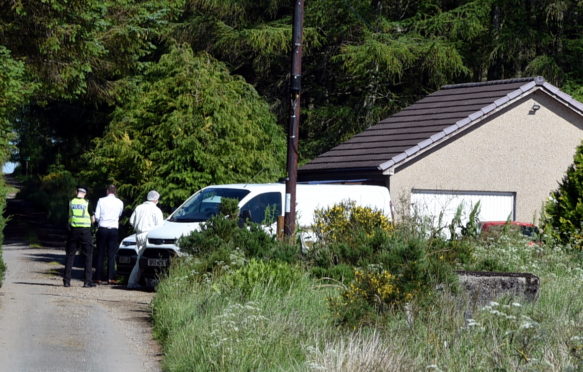A young man on a five-day drugs binge brutally murdered an innocent dad after smashing into his home.
Liam Hay stabbed Anthony McGladrigan nine times at the victim’s home in Cuminestown, Aberdeenshire, in June this year.
The 20-year-old – initially brandishing a baseball bat and described as “delusional” – had been chasing after a friend.
They sought shelter in Mr McGladrigan’s nearby house and, with the 51-year-old hotel worker offering refuge, Hay turned on him instead.
The High Court in Glasgow was told Mr McGladrigan shouted to his wife Fiona: “Oh my god. I have been stabbed”.
She desperately tried to save her husband, but he later died in hospital as a result of “multiple” stab wounds to his back and chest.
Hay now faces a life sentence after he pled guilty to a murder charge. He will be sentenced in the New Year.
His QC, Ian Duguid, told the hearing: “If there was ever an example for a campaign against the taking of controlled drugs, then this is it.”
The High Court heard the farm worker and friends had been bingeing on drink and drugs, including cocaine and the stimulant M-Cat, at various places between June 21 and 26 – the day of the killing.
At one stage, Hay partied at his grandparents’ house while they were on holiday in Spain. The property was just a short distance from Mr McGladrigan’s family home.
Prosecutor Erin Campbell said the killer was described latterly as “tripping” and his behaviour said to be “increasingly strange”.
At about 4.30 on the morning of the murder, one of Hay’s friends tried to wake him.
The killer got up, but then grabbed a baseball bat and claimed he “wanted a word” with him.
The scared friend immediately raced out of the house, as Hay yelled threats at him, and eventually banged on Mr McGladrigan’s door.
The father-of-two – who worked at the Sandman Signature Hotel in Aberdeen – was in bed with his wife, having just finished a shift a shift.
Mr McGladrigan let Mr Smith in and shouted to his wife: “Stay in the room. He says he is being chased by someone with a bat.”
A bare-footed Hay then stormed up and tried to open the door to the house.
Mr McGladrigan pleaded with him: “No, I am not letting you in. Calm down. Put the baseball bat down.”
But, the thug instead used the weapon to smash glass and force his way in.
The court heard it appeared Hay had thereafter grabbed a knife from the victim’s home and repeatedly stabbed him.
His wife dialled 999 as her dying husband slumped to the floor.
Mrs McGladrigan then spotted Hay still in her home, but did let on she had seen him.
He remained there, hiding and still clutching the murder weapon, until police arrived. He gave his name as “Lewis Capaldi”.
Hay later claimed he could not remember anything and on initially being charged with attempted murder, said: “What? No way. Honestly?”
Mr Duguid said the killing was a “truly awful case”.
He told the court Mr McGladrigan’s family had written “powerful” victim statements and that his client was “devastated”.
Mr Duguid said: “There is no real explanation other than he had consumed two controlled drugs over a number of days.”
After his death, Mr McGladrigan’s hotel colleagues described him as “hugely well-liked and always smiling”.
He had been a quality service leader at the Sandman’s Chop Grill and Bar.
Police welcomed Hay’s conviction, saying the killer had to be held “accountable for his own actions”.
Detective Inspector Gary Winter, of the major investigation team, said: “Our thoughts are with Anthony’s family and friends as they continue to come to terms with his tragic and needless loss.
“Anthony was murdered in his own home having offered refuge to Austen Smith, who was being pursued by Liam Hay.
“Liam Hay then forced entry to the back door using the baseball bat and was confronted by Anthony. During this confrontation Liam Hay repeatedly stabbed Anthony, causing fatal injuries.
“The consumption of drugs by Liam Hay has been indicated as a contributory factor in Anthony’s murder, however if you have voluntarily consumed drugs you are accountable for your own actions and conduct, no matter how catastrophic they may be.”
